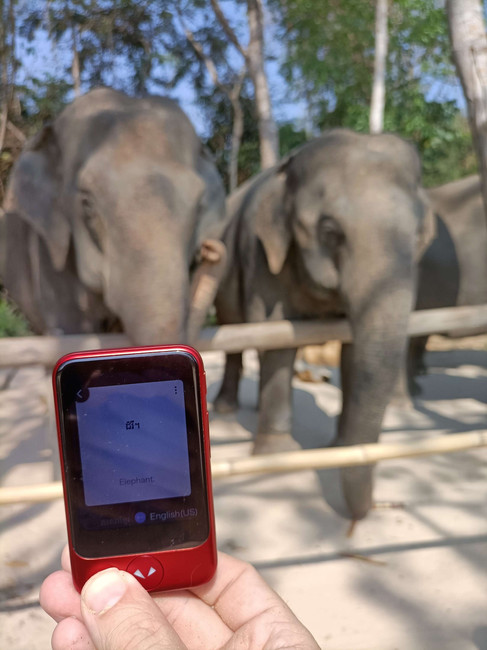Pocketalk saves the day again! A review of using the Pocketalk translator in Vietnam and Cambodia.
- teamthomastravels
- May 10, 2023
- 5 min read
Updated: Jun 7, 2023
We've previously spoken about our collaboration with Pocketalk on last summer's Spanish road trip - their Pocketalk Voice S Translator helped us to communicate in Catalan Spanish, Catalan and even Basque as we travelled around the country and made such a difference. From asking an Alicante campsite if we could pay to use their showers to chatting to Toledo residents about what to expect at the Corpus Christi festival, and choosing fancy pintxos in San Sebastian, the nifty little Pocketalk S device enabled us to make some really fun connections beyond "una mesa para dos por favor." If you're interested in buying your own, we're sharing a 20% off code later on in this blog!

When we were planning our trip to Vietnam and Cambodia, the Pocketalk S was the first thing we packed - this clever device is able to translate 82 languages including Vietnamese and Khmer and as well as allowing us to have real time, two way conversations with locals both speaking in our own respective languages, the device's camera means you can take a photograph of a menu or information board and translate the whole block of text.
Using the Pocketalk S Translator in Vietnam:
Two way translation apps are very popular in Vietnam - many young people have Google translate running on their mobile phones, especially Grab taxi drivers who want to ask you to book them again for your adventures the next day. However, this requires mobile data, and we decided not to get a SIM card for our phones, which meant we couldn't access 5G roaming. The Pocketalk S includes its own 2 year SIM card that provides cellular data coverage in more than 130 countries and regions, so as long as you have phone signal, you can use it without needing WiFi.
When our taxi driver in Hanoi was taking us to the wrong airport terminal, when we asked our driver to Hue about the mountains we could see out the window and when we wanted to ask our Grab driver to wait for us while we looked around the Lady Buddha pagoda in Da Nang, we were able to communicate in clear full Vietnamese sentences with correct grammar and understand their replies when they only had limited English.
I loved being able to tell our favourite Hanoi Bahn Mi seller that her sandwiches were the best in the city - we were able to convey so much more to her than with just an emphatic thumbs up!
Using the Pocketalk S Translator in Cambodia:
While we tried to learn some rudimentary Khmer for the Cambodian leg of our trip, hello, goodbye and thank you can only get you so far. What I really liked about the Pocketalk S was that you can speak into the device an then listen to the translation over and over again to practice words and phrases. Because Vietnamese and Khmer are both tonal languages, our accents and pronunciation were pretty appalling, so it was very useful to be able to first speak English into our Pocketalk and then play the translated sentence out loud to the person we were speaking to, or failing that, show the text on the device's screen for them to read. Spoken English was very limited in Cambodia, especially outside of the main tourist hubs of Siem Reap and Phnom Penh, so this pocket translator was a godsend!
Here's how Pocketalk really saved our bacon in Cambodia's capital, Phnom Penh:
We had just finished touring the Tuol Sleng Genocide Museum, the harrowing Security Prison 21 where Pol Pot's Khmer Rouge regime imprisoned, interrogated and tortured thousands of civilians and political prisoners. and wanted to visit the Choeung Ek Genocidal Centre, 17km out of the city. Approaching the tuk tuk drivers hanging around outside the prison entrance, the quoted fare immediately rocketed to outrageous proportions, from $12-$18!
One of the reasons why we liked using the Grab app on our trip (like Uber but for tuk tuks, cars and motorbikes) was that when you plug a journey in, it calculates the correct fare for you, which means you know exactly how much you should be paying without getting ripped off. When we'd checked the day before, the app said that a tuk tuk out to Choeung Ek should cost around $6, so the drivers were clearly trying their luck!
Despite our protesting, haggling wasn't getting us anywhere and so we decided to walk away and order a tuk tuk on Grab. But this is where we hit a stumbling block- WiFi! We had decided not to get a Cambodian phonecard for our trip as we were only in the country for a week, and generally we had found WiFi all over the place if we needed to use Google Maps or check our emails... until now. The museum's WiFi was down, so we set off walking down the street looking for a cafe where we could buy a coffee and use their internet. By now it was about 12pm and scorching hot, and surprisingly, considering we had just left a major tourist site, cafes were non existent! We'd got to the point where we had our phone screens open as we walked, refreshing the available networks listed, looking for anything with WiFi, when we saw the name of the shoe shop over the road pop up.

Now, we couldn't very well just march in and say "WiFi?" - they'd quite rightfully tell us it's not for the public - so we needed to know how to explain that we were struggling to book a taxi and would only be using their internet for that, not that we were planning on sitting on the kerb outside and rinsing their data for the next hour. Here's where Pocketalk came in!
As we said before, unlike our phones, the Pocketalk S voice translator has it's own inbuilt SIM card so doesn't need WiFi to work. Holding the speak button, David said "please can we use your WiFi to order a taxi?" The Pocketalk translated his question into Khmer, and when he took the device into the shop and played the sentence out loud for the woman behind the counter, she was more than happy to help him connect to their network and order our tuk tuk. Success!
We even made a reel on our Instagram about this moment.
Using Pocketalk's inbuilt currency converter
One last thing we'd love to share that really helped us out on our trip was Pocketalk's inbuilt currency converter. Vietnamese Dong can be incredibly confusing as the notes are all massive! You'll typically be using 100,000-500,000 VND notes, and with that many 0s it's hard to keep track of what's expensive and what isn't (For the record, it's about 28,000 VND to the British Pound, so 100,000 VND is just over £3).
Likewise in Cambodia, rather than dividing everything by 4000 to convert Riel to US Dollars (typically we would pay in Dollars and receive our change in Riel), we would quickly type the amount into the Pocketalk an get an easy conversion. Just like with languages, the Pocketalk translator covers dozens of different currencies so will come in handy on all of our travels!
Our Pocketalk discount code
As promised, we are able to offer an exclusive 20% discount code to you lovely lot if you'd like to get your hands on your own super useful Pocketalk translator for your next trip. Head to this Amazon link and enter 20THOMAS to claim your discount!
We were invited to test out the Pocketalk S translator and create content both here and on our Instagram as part of a paid campaign, but as always, all opinions are our own and this is an honest review. The discount code is a perk Pocketalk has offered to our followers, but we don't make any commission from sales, we're recommending it because it's a brilliant piece of travel kit!
Pin this blog for later!








